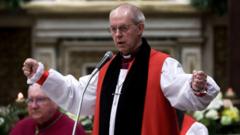
Justin Welby Resigns as Archbishop of Canterbury Over Failure to Report Child Abuser
Justin Welby has resigned as Archbishop of Canterbury after an independent review revealed his failure to report prolific child abuser John Smyth. The damning report highlighted systemic failures within the Church of England to address serious allegations of child abuse.
The Makin review found that Smyth had attacked dozens of boys at Christian camps in the UK during the 1970s and 1980s, and continued his abuse in Zimbabwe and South Africa, potentially victimizing up to 100 boys aged 13 to 17. By 2013, the Church of England knew about Smyth’s abuse at the highest levels, including Welby, who had just taken the Church’s top job that year.
The abuse allegations first surfaced in the early 1980s when a report detailing Smyth’s “horrific” beatings was presented to Church leaders. However, the recipients participated in an active cover-up to prevent the findings from becoming public. The abuse re-emerged in 2012 when a church officer received a letter from a survivor, and between 2013 and 2016, five police forces were informed. Despite this, Church leaders did not file a formal report.
It wasn’t until a 2017 Channel 4 documentary that a full police investigation was launched. Smyth is believed to have continued his abuse until his death in 2018.
Welby, who had worked at the summer camps where Smyth met some victims, claimed he was unaware of the full nature of the allegations until 2013. A clergy member had warned him about Smyth in the 1980s, but Welby described the warning as “vague” with no indication of the extent of the abuse.
Following the Makin review, Welby acknowledged that he had “personally failed to ensure it was energetically investigated.” He had previously apologized to Smyth’s victims after the 2017 documentary but had resisted calls to step down.
Mounting pressure ultimately led to his resignation. A petition calling for his removal, which accused him of “allowing abuse to continue,” was signed by over 14,000 people. Critics, including Bishop Helen-Ann Hartley, argued that his resignation would draw a line under the scandal and move towards independent safeguarding.
The process of selecting a new Archbishop of Canterbury will take at least six months. A consultation will gather input from people inside and outside the Church to create a longlist of candidates. The selection committee, which includes representatives from the global Anglican Communion, will interview potential candidates, with at least two-thirds of members needing to agree on the final choice.
The Archbishop of Canterbury serves not only as the head of the Church of England but also as the spiritual leader of the worldwide Anglican community, making the selection a significant global responsibility.








